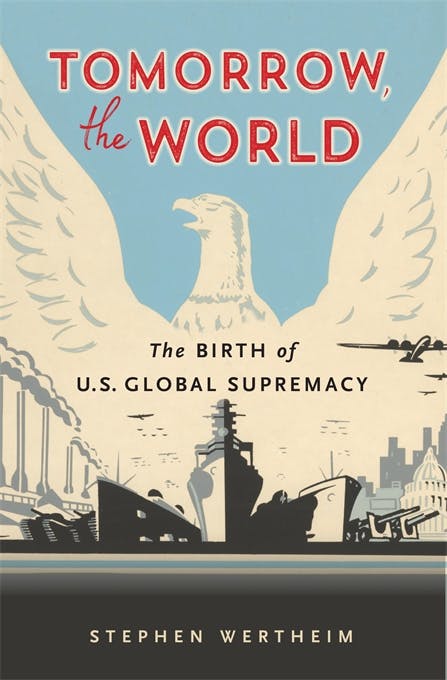America has no duty to rule the world
The United States is the world’s overwhelming military power, and it’s not even close. The country controls about 750 overseas bases (China, by comparison, has only one foreign base, in Djibouti). It spends around $730 billion on its military, which is more than China, India, Russia, Saudi Arabia, France, Germany, the United Kingdom, Japan, South Korea, and Brazil combined. It has over 190,000 soldiers deployed in approximately 140 foreign countries—around 70 percent of the world’s total. To many Americans and foreigners alike, this power appears as a natural fact of international relations. Very few people alive today can remember a time when the United States did not have the ability to destroy much of the globe.

Buy on Bookshop
Belknap Press, 272 pp., $29.95
There are various ways to narrate why the United States, a nation-state founded in an anti-colonial revolution, became the most powerful empire in history. You may call it destiny, the fulfillment of the country’s millenarian promise to become, as the Puritan leader John Winthrop declared in a 1630 sermon, “a city upon a hill” for the world’s benighted. Or you may claim it was the United States’ vast material resources and its geographical luck, surrounded by two vast oceans and weak neighbors, that enabled it to develop its capacities to govern the world. Perhaps if you’re a Marxist, you’ll insist it was capitalism’s unquenchable appetite that drove U.S. elites to expand from sea to shining sea before turning their gaze abroad in search of more territory to exploit. And if you’re an apologist for U.S. power, you can affirm that dominance was forced upon the United States by Europe’s two world wars, which impelled the mantle of “Western civilization” to pass from the Old World to the New, or by the attack at Pearl Harbor, to which any reasonable nation would have replied with force.
In Tomorrow, the World, historian Stephen Wertheim highlights an overlooked cause of the United States’ ascendance: the fall of France in June 1940. When the French military collapsed in the face of Adolf Hitler’s blitzkrieg, a generation of American foreign policy elites worried that if the British Empire also fell, there would be no great power left to challenge Nazi dominance and ensure liberalism’s future. The United States, they concluded, needed to fill that role, and the only way to do so was for it to become a major military power dedicated to protecting the free exchange of ideas, people, and, especially, goods. At first, Americans mostly confined their vision of a U.S.-led order to the Western Hemisphere. But after the nation entered World War II in December 1941, and Nazi success seemed less assured, those visions expanded to encompass most of the globe. Peace, prosperity, and liberalism itself depended on world-spanning U.S. armed primacy.
This conviction became an essential component of the imperialist ideology that U.S. elites developed and institutionalized during the Cold War, and it remains widely held today. Because Americans identify stability with dominance, the United States spends an unconscionable amount on its military and pursues a series of endless wars that have little strategic benefit, do nothing to improve the lives of Americans or those suffering abroad, and, ironically, engender instability. Wertheim, one of the founders of the Quincy Institute for Responsible Statecraft, an anti-militarist think tank backed by George Soros and Charles Koch, has devoted his career to challenging the shibboleths that surround U.S. primacy. Just as Americans once chose to rule, he argues, they can likewise choose not to.
Read the full article in The New Republic.




